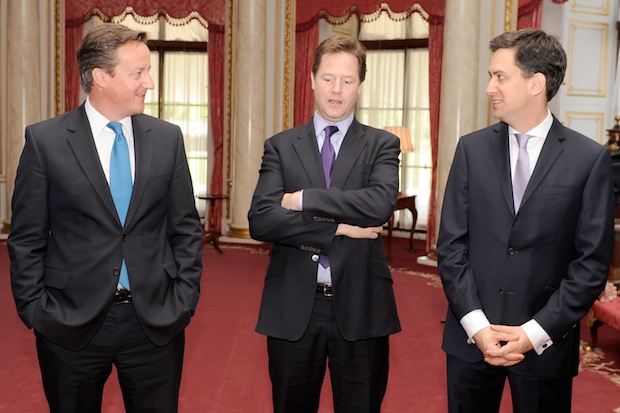Listen
This is a unique moment in British politics. All three major parties have a realistic prospect of being in power after the next election, but they are all acutely aware that they’re won’t be swept to power. Success will have to be eked out constituency by constituency — so the expensive business of polling specific constituencies, normally left until much closer to the election, is under way for all three. And that’s not all.
The Liberal Democrats know that an election that followed the national swing would be a disaster for them. So they are busy digging in at each of the 57 seats they hold. They’ve drawn up a league table of their MPs based on how much canvassing they do, and those who slip into the bottom half are getting a call from Nick Clegg telling them to up their game. Combine this with the Liberal Democrats adopting the American practice of pork barrel politics, funnelling government favours to key seats, and you can see how — contrary to popular expectations — the party can hold on to the majority of its MPs.
The Tories, for their part, are determined to wring every last drop of advantage out of being the incumbents. In the 48 most marginal seats they are defending, Conservative campaign headquarters is paying for a steady stream of leaflets touting the local MP’s achievements. The aim is to establish the MP so strongly that he can outperform the national campaign. And the early signs are that it’s working. Tory MPs in these seats are considerably more confident about their own prospects than they were a year ago.
The Tories are also using the levers of national government to promote their record in office. This week, 1.8 million small businesses will receive a letter from the Prime Minister telling them about the new employment allowance which will knock £2,000 off their National Insurance bill.
Labour is trying to minimise these Tory advantages by selecting its candidates early; in 90 per cent of the seats where it is running second, it already has its challenger in place. The party hopes that these candidates will have chipped away at their opponents’ standing long before the campaign proper begins.
Labour is still uncertain, though, about how many constituencies to target. This dilemma is heightened by the party’s conviction that it will be heavily outspent by the Tories. At the start of the year, one member of the Tory board told me that he expected the party to raise another £46 million by the election. Labour will only raise a fraction of that.
But if the prospect of power is making campaigning more intense, it is also creating a mutual interest in making the government machine work better. The last two times power changed hands in this country, the successful opposition party had been out of office for well over a decade. So they were uncertain about how government worked and hesitant to propose any reforms to the process. They accepted the civil service’s assurances about how things should be done.
But Labour, having been in office so recently, is not starry-eyed about Whitehall. You won’t hear its shadow ministers talking glibly about how the civil service is the best in the world, as the Tories did before the last election. Labour has not fought Francis Maude’s plans to let ministers appoint their own civil servants. The party leadership well understood that if they win the next election, they will benefit from these changes.
Miliband has already appointed Charlie Falconer, Tony Blair’s factotum, to look at the way Whitehall operates. If Miliband does become Prime Minister, expect 10 Downing Street to be bulked up at the expense of other government departments — including the Treasury. Miliband doesn’t have to accommodate Ed Balls in the way that Tony Blair accommodated Gordon Brown. Nor does he want to merge 10 and 11 Downing Street in the way that David Cameron and George Osborne have.
All three parties think there is an opportunity to establish a political consensus on civil service reform. Bernard Jenkin, the chair of the House of Commons Public Administration Select Committee, is keen on a parliamentary commission. But many in government fear that would mean the issue being kicked into the long grass. They are far more enthusiastic about a cross-party review of the civil service launched this week by the former policing minister Nick Herbert and Labour’s last housing minister, John Healey.
This review has already won some significant backers in Westminster and Whitehall. Those involved include Lord Browne, the former BP boss and the government’s lead non-executive director; Sir Michael Barber, who advised Tony Blair on how to make government more efficient; and Margaret Hodge, the formidable chairman of the Public Accounts Committee, who has shone a light on Whitehall incompetence. Cameron and Miliband are both sympathetic to the review’s aims.
Herbert and Healey hope that their review, entitled Govern Up, will report in 12 months’ time and will have the support of all three party leaders by the next election. It is likely to advocate more powers for the Treasury over spending departments, an easier route into the civil service for private-sector talent, and the devolution of more powers to local people and government.
As a topic, Whitehall reform can seem extremely insular: the political class talking to itself. It is tempting to ask why a voter in Rotherhithe or Rotherham should care about the institutional relationship between No. 10 and government departments or about civil service recruitment procedures. But without reform of Whitehall, public service reform won’t succeed. The success of Universal Credit, a system that could change lives and always make it worthwhile to work rather than claim benefits, hinges on the ability of the civil service to deliver a major IT project; which is why even many government ministers are sceptical about whether it will ever be implemented in full.
The civil service has proved remarkably adept at dodging reform. Maude, in his efforts to change Whitehall, has been struck by how many of the things that Marcia Williams, Harold Wilson’s political secretary, complained about in the 1960s are still true today.
What all three parties have realised is that if government is to work, the civil service can’t continue being the last great unreformed public service. It is time for Sir Humphrey to change his ways.
Got something to add? Join the discussion and comment below.
You might disagree with half of it, but you’ll enjoy reading all of it. Try your first month for free, then just $2 a week for the remainder of your first year.














